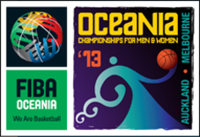| 21st FIBA Oceanian Basketball Championship | |
|---|---|
 Official logo of the 2013 FIBA Oceania Championship | |
| Tournament details | |
| Host countries | New Zealand Australia |
| Dates | 14–18 August |
| Teams | 2 |
| Venue(s) | 2 (in 2 host cities) |
| Final positions | |
| Champions | |
| Tournament statistics | |
| Top scorer | |
| Top rebounds | |
| Top assists | |
| PPG (Team) | |
| RPG (Team) | |
| APG (Team) | |
The 2013 FIBA Oceania Championship for Men was the 21st edition of the FIBA Oceania Championship. The tournament featured a two-game series between Australia and New Zealand between 14 and 18 August. [1] [2] It also served as the qualifying tournament of FIBA Oceania for the 2014 FIBA Basketball World Cup in Spain. [1] The first game was held in Auckland, New Zealand followed by the second game in Canberra, Australia. [1] [2] Australia won their 18th title in the tournament, but the two teams still advanced to the World Cup.


